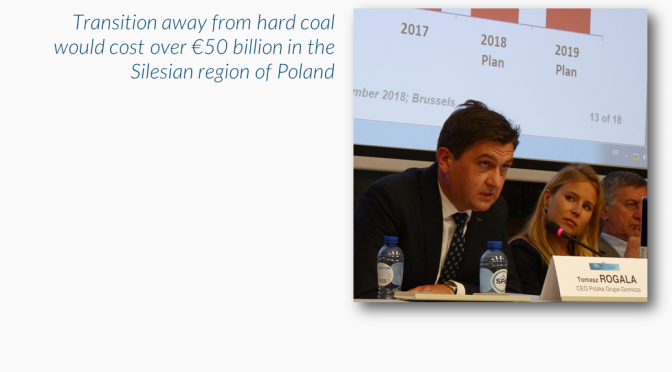
Addressing the third working group meetings of the Coal Regions in Transition Platform in Brussels on 5 November 2018, EURACOAL President Rogala advised that, when talking of change in the coal mining sector, the conversation must reflect the importance and maturity of this sector’s value chain.
The Coal Platform is an initiative of the European Commission to assist regions who wish to transition away from coal.
Throughout the coal mining sector, he explained, engineers operate and maintain technically advanced equipment on a daily basis, while scientists search for ways to improve production processes and coal utilisation. Thus, the economic value to society as a whole goes beyond the supply of energy to include the creation of knowledge and competences.
According to Mr. Rogala, coal mining jobs in the Silesian region of Poland are well paid, exceeding average salaries there by 50%. During the transition, he expressed his concern that any new jobs would be less well paid. He also noted that municipalities are very dependent on local taxes and would suffer if income from the coal mining sector were to be lost. For example, in the first nine months of 2018, €575 million was paid in local and national taxes by his own company, the Polish Mining Group or PGG. The company has an annual turnover of over €2.6 billion, employing 42,000 people plus over 3,000 contractors. Beyond that, there are some 150,000 jobs at suppliers of equipment and services. Mr. Rogala estimated that equipment purchases alone were worth €220 million each year. He called for a socially responsible transformation, warning against the erosion of industry in regions such as Silesia as this could undermine citizens’ trust in authority and ultimately lead to radicalism.
On a positive note, he presented what is probably the largest welding shop in Central and Eastern Europe, part of the PGG group and employing skilled welders and machinists with all the latest equipment on a floor area of over 2 hectares. By developing such competencies – from design, production, finishing, supply and erection – PGG will be able to diversify and compete in new sectors such as automotive, rail and construction. Mr. Rogala expects this business to grow strongly in the short to medium term.
He concluded with a list of recommendations on the importance of the value chain linked to coal mining. This ensures stability and provides an opportunity for businesses to diversify into new areas in support of a successful transition with lower risks. The alternative would be costly, he said. The University of Economics in Katowice has calculated that over €50 billion would be needed simply to replace lost jobs in coal mining with jobs in other mature industrial sectors, such as automotive.
Responding to strident criticism from the many green NGOs present, EURACOAL President Rogala was open to a discussion on how coal could be replaced, but observed calmly that there were no viable alternatives currently on the table – only promises and rhetoric.


